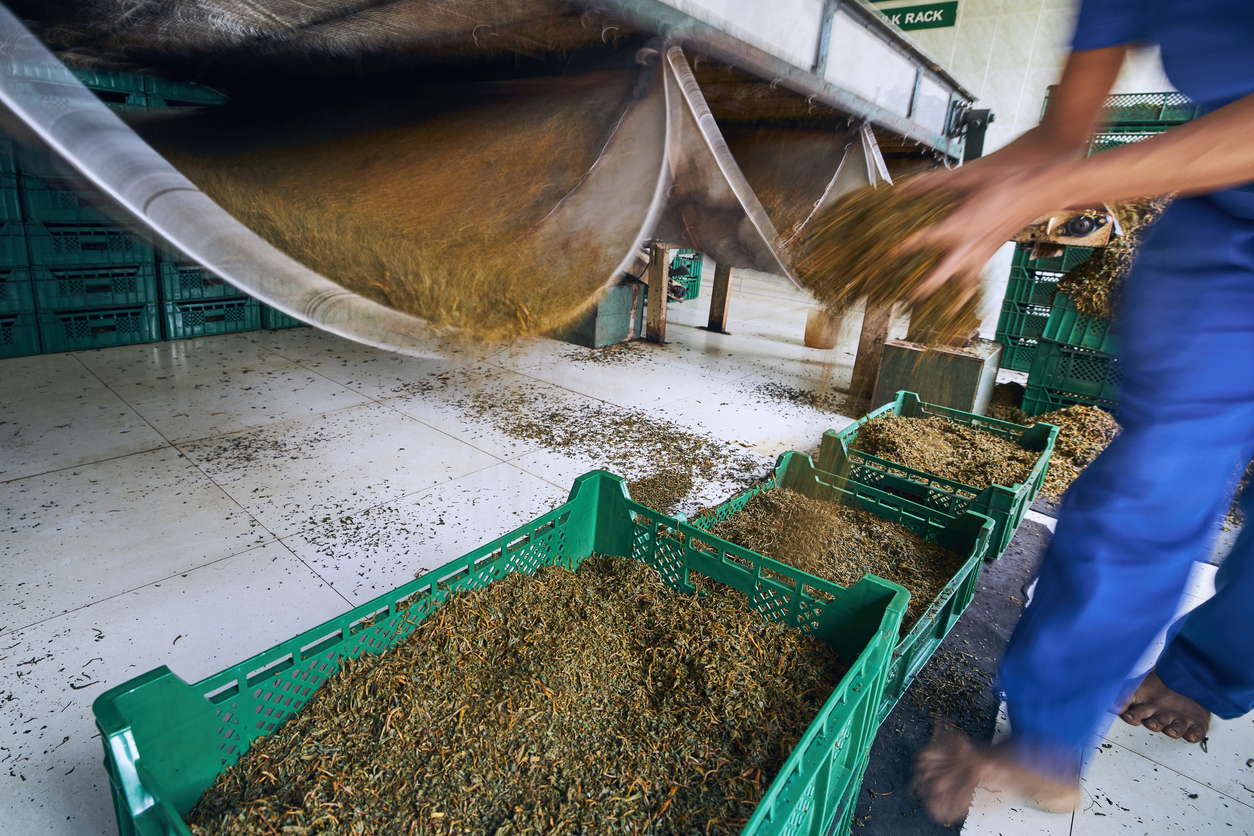Inside Look: How Wigmore Trading Revolutionizes Tea Processing in Nigeria
Inside Look: How Wigmore Trading Revolutionizes Tea Processing in Nigeria
Welcome tea enthusiasts and curious minds alike! Today, we are thrilled to take you on an exclusive journey into the heart of Wigmore Trading, Nigeria’s pioneering force in tea processing. Prepare to be captivated as we unveil the secret behind their revolutionary techniques and witness firsthand how they are redefining the art of tea production. From lush plantations to state-of-the-art facilities, join us as we dive deep into this fascinating world and uncover the hidden gems that make Wigmore a true game-changer in Nigeria’s flourishing tea industry. Get ready to sip your way through innovation like never before – let’s embark on this exhilarating inside look together!
Introduction: Brief overview of tea production in Nigeria and the role of Wigmore Trading
Introduction: Brief overview of tea production in Nigeria and the role of Wigmore Trading
Nigeria is a country known for its vast agricultural resources, with an abundance of crops such as cocoa, rubber, and cotton. However, one crop that often goes overlooked is tea. Tea production in Nigeria dates back to the 19th century when it was introduced by British colonizers. Today, Nigeria is the largest producer of tea in West Africa, with an estimated annual production of 5 million kilograms.
Tea production in Nigeria mainly takes place in the central and eastern regions of the country, where the climate and soil conditions are favorable for growing tea plants. The majority of tea produced in Nigeria is black CTC (cut-tear-curl) tea, which is used to make traditional Nigerian drinks such as “sahara,” a blend of black tea and spices.
While there has been significant growth in the Nigerian tea industry over recent years, there have also been challenges faced by local producers. These include outdated processing methods and inadequate infrastructure for storage and transportation leading to lower quality products.
That’s where Wigmore Trading comes into play – a company dedicated to revolutionizing tea processing in Nigeria.
Role of Wigmore Trading:
Wigmore Trading was established with a vision to improve the overall quality and efficiency of Nigerian agriculture through modern technology and techniques. The company has been instrumental in supporting small-scale farmers by providing them with training on improved farming practices that result in higher yields.
Background: History and evolution of tea processing in Nigeria
Tea has been a popular beverage in Nigeria for centuries, with its consumption and production dating back to the 19th century. However, the history of tea processing in Nigeria can be traced even further back to the early 1800s when British missionaries first introduced the cultivation of tea plants to the country.
During this time, Nigeria’s climate and soil conditions were found to be suitable for growing tea plants, primarily in the eastern and western regions. As a result, large-scale tea plantations started to emerge in these areas, with British colonial companies taking over most of the production and exportation.
In the early days, traditional methods of tea processing were used by small-scale farmers who plucked leaves by hand and processed them using rudimentary techniques. This process involved withering, rolling, fermentation, and drying before being packed for exportation.
However, as demand for Nigerian-grown teas grew globally, there was a need for more efficient and modern methods of processing. Thus began the evolution of tea processing in Nigeria.
In the mid-20th century, with advancements in technology and machinery used for tea production worldwide, Nigeria also adopted modern techniques such as CTC (crush-tear-curl) method that allowed for faster processing and higher yields. This method involves crushing or tearing fresh green leaves into smaller pieces before being rolled and fermented to produce black teas.
Challenges faced by traditional tea processors
Traditional tea processing in Nigeria has been a long-standing tradition, passed down from generation to generation. However, this traditional method of processing tea leaves is now facing numerous challenges that have impacted the quality and efficiency of production. In this section, we will discuss the major challenges faced by traditional tea processors in Nigeria.
1. Lack of Modern Technology
One of the main challenges faced by traditional tea processors is the lack of modern technology in their production process. Most small-scale tea processors still rely on manual labor and outdated machinery to process their tea leaves. This results in low productivity and poor quality control as compared to modern methods used by larger companies. Moreover, without proper equipment and technology, traditional processors are unable to meet the increasing demand for high-quality teas.
2. Inefficient Processing Techniques
The traditional method of processing tea leaves involves withering, rolling, oxidizing and drying them under natural conditions. This technique is time-consuming and relies heavily on weather conditions which can be unpredictable at times. As a result, there may be inconsistency in the final product leading to lower quality teas.
3. Limited Knowledge and Skills
Another challenge faced by traditional tea processors is limited knowledge and skills regarding modern techniques for producing high-quality teas. Most of these processors have learned their craft from their ancestors without any formal training or exposure to new developments in the industry. This makes it difficult for them to keep up with changing consumer preferences or adapt to new methods that could improve their production processes.
Revolutionizing Tea Processing with Wigmore Trading:
Wigmore Trading is a leading company in the tea industry, and their mission is to revolutionize the way tea is processed in Nigeria. With a strong commitment to quality, innovation, and sustainability, Wigmore Trading has emerged as a game-changer in the Nigerian tea market.
One of the key ways that Wigmore Trading is revolutionizing tea processing is through their state-of-the-art facilities and equipment. They have invested heavily in modern machinery and technology that allows for efficient and high-quality processing of tea leaves. This includes advanced sorting, cutting, drying, and packaging machines that ensure consistency in every batch of tea produced.
But it’s not just about the equipment – Wigmore Trading also prioritizes training and skill development for their employees. They have a team of highly trained professionals who are experts in the art of tea processing. These individuals undergo continuous training to keep up with the latest advancements in technology and techniques to ensure that only the best quality teas leave their facility.
In addition to investing in technology and people, Wigmore Trading also places great importance on sourcing high-quality raw materials. They work closely with local farmers across Nigeria to obtain fresh, hand-picked tea leaves from only the best plantations. This not only guarantees top-notch quality but also supports local communities by providing them with a sustainable source of income.
– Innovative methods and technologies used by Wigmore Trading
Wigmore Trading, a leading tea processing company in Nigeria, has been at the forefront of innovation and technology in the industry. With a commitment to producing high-quality tea using sustainable practices, Wigmore Trading has implemented various innovative methods and technologies to revolutionize the way tea is processed in Nigeria.
1. Solar Drying Technology:
One of the most significant changes brought about by Wigmore Trading is the implementation of solar drying technology. Traditionally, tea leaves are dried using fossil fuel-powered dryers, which not only contribute to air pollution but also add to the production costs. However, Wigmore Trading has introduced solar-powered dryers that use renewable energy to dry tea leaves effectively and efficiently. This technology not only reduces their carbon footprint but also helps in producing cleaner and healthier teas.
2. Automated Processing:
Another innovative method used by Wigmore Trading is automated processing. Instead of relying on manual labor for tasks such as sorting and grading, the company uses advanced machines equipped with artificial intelligence algorithms to perform these tasks accurately and quickly. This not only increases efficiency but also ensures consistency in quality control.
3. Vacuum Packaging:
Wigmore Trading understands that proper packaging plays a crucial role in maintaining the freshness and quality of tea leaves. To ensure this, they have implemented vacuum packaging for their products. This technique removes oxygen from inside the package before sealing it, preventing oxidation and preserving the flavor and aroma of the tea for longer periods.
– Impact on the quality and quantity of tea produced
The impact of Wigmore Trading’s innovative tea processing methods goes beyond just improving efficiency and profitability. It also has a significant effect on the quality and quantity of tea produced in Nigeria.
Quality is one of the key factors that determine the success of any tea brand. With Wigmore Trading’s state-of-the-art processing facilities, there is a marked improvement in the standard of tea produced in Nigeria. The company uses modern techniques such as withering, rolling, fermentation, and drying to ensure that only the finest leaves are used in their production process.
The withering process involves exposing freshly picked tea leaves to controlled airflows to remove excess moisture. This step is crucial in preserving the natural flavor and aroma of the tea leaves. Traditional methods of withering involve spreading out the leaves on mats under direct sunlight or manually fanning them, which can lead to uneven withering and affect the overall quality of the final product. However, Wigmore Trading’s automated withering machines ensure a consistent level of moisture removal, resulting in superior quality teas.
Another significant impact on quality comes from Wigmore Trading’s rolling process. This stage involves breaking down and shaping the tea leaves into smaller particles to release essential oils that give each variety its unique taste and fragrance profile. The company uses advanced rolling machines equipped with adjustable pressure controls to achieve optimal results for different types of teas.
– Benefits for local farmers and the economy
Wigmore Trading, a leading tea processing company in Nigeria, has revolutionized the way tea is produced and sold in the country. One of the major benefits of this transformation is its positive impact on local farmers and the economy as a whole.
Firstly, Wigmore Trading has provided a reliable market for local tea farmers. Prior to its establishment, many Nigerian tea farmers struggled to sell their produce due to lack of access to buyers or low prices offered by middlemen. With Wigmore Trading’s entry into the market, these farmers now have a guaranteed buyer who offers fair prices for their tea leaves. This has not only improved the livelihoods of these farmers but also encouraged more individuals to take up tea farming as a source of income.
Furthermore, Wigmore Trading has introduced modern and efficient farming techniques to local farmers. The company provides training and education programs on best practices for growing high-quality tea leaves. This has resulted in an increase in crop yield and improved quality of the final product, which ultimately leads to higher earnings for the farmers.
In addition to directly benefiting local tea farmers, Wigmore Trading’s operations also contribute significantly to the economy. The company employs hundreds of people across its various processing plants and offices, providing job opportunities for both skilled and unskilled workers. This employment not only helps reduce unemployment rates but also boosts consumer spending power within communities where these plants are located.
Sustainability efforts:
Sustainability efforts have become a major focus for many industries in recent years, and the tea industry is no exception. At Wigmore Trading, we are committed to implementing sustainable practices throughout our entire tea processing operation in Nigeria. From sourcing to packaging, we strive to make environmentally responsible choices that not only benefit our business but also contribute positively to the communities and ecosystems around us.
One of our key sustainability initiatives is our commitment to using ethically sourced tea leaves. We work closely with local farmers in Nigeria who grow their crops using organic methods, without the use of harmful pesticides or chemicals. This not only ensures that our teas are free from harmful substances but also supports small-scale farmers and promotes sustainable agricultural practices.
In addition to ethical sourcing, we also place great importance on reducing waste and conserving resources. Our state-of-the-art processing facility utilizes energy-efficient machinery and processes designed to minimize energy consumption and reduce carbon emissions. We have also implemented a comprehensive waste management system that includes recycling programs for materials such as paper, plastic, and metal.
Furthermore, we are proud to say that all of our packaging materials are eco-friendly and biodegradable. We believe it is essential to minimize the environmental impact of our products from start to finish, which is why we use compostable materials for all of our tea bags and boxes.
– Environmentally friendly practices implemented by Wigmore Trading
Wigmore Trading is committed to practicing environmentally friendly methods in every step of its tea processing operations. As a company that values sustainability and responsible resource management, Wigmore Trading has implemented several practices to minimize its environmental impact and promote a more eco-friendly approach to tea production.
1. Sustainable Sourcing of Raw Materials:
One of the primary ways Wigmore Trading ensures an environmentally friendly process is by sourcing its raw materials sustainably. The company works closely with local farmers who use organic farming methods without the use of harmful chemicals or pesticides. This not only promotes sustainable agricultural practices but also ensures that the tea leaves are free from any harmful residues.
2. Water Conservation:
Tea processing requires a significant amount of water, which can put a strain on local water resources. To combat this issue, Wigmore Trading has implemented various measures for efficient water management. These include using low-flow irrigation systems, recycling and reusing wastewater for irrigation purposes, and implementing rainwater harvesting techniques.
3. Energy Efficiency:
Another crucial aspect of Wigmore Trading’s environmentally friendly practices is energy conservation. The company has invested in energy-efficient machinery and equipment to reduce electricity consumption during the tea processing stages. Additionally, renewable energy sources such as solar power have been incorporated into the production process to further reduce carbon emissions.
4. Waste Management:
To minimize waste generation, Wigmore Trading follows a strict waste management system at its processing facilities in Nigeria.








Comments are closed.